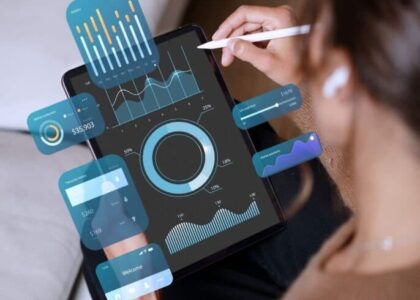The automotive industry, long associated with innovation and technological advancements, is currently undergoing a seismic shift towards digital transformation. This transformation is driven by a combination of consumer expectations, regulatory changes, and the need for sustainability. In this article, we will delve into the digital transformation journey of the automotive industry, exploring how technology is reshaping everything from vehicle design and manufacturing to the driving experience and customer service.
The Digitalization of Vehicle Design
Digital transformation in the automotive industry begins at the very inception of a vehicle – the design phase. Traditional clay modeling and physical prototypes are giving way to cutting-edge digital design tools and technologies. Computer-Aided Design (CAD) and Computer-Aided Engineering (CAE) software enable designers and engineers to create and simulate vehicles in a virtual environment. This not only accelerates the design process but also allows for better optimization of aerodynamics, safety, and fuel efficiency.
Moreover, with the rise of 3D printing, manufacturers can quickly prototype and test new components, reducing the time and cost associated with traditional manufacturing processes. These advancements in digital design have led to more innovative and efficient vehicles hitting the market.
Smart Manufacturing and IoT Integration
Digital transformation extends to the manufacturing process itself, where the Internet of Things (IoT) plays a pivotal role. Smart factories leverage IoT sensors, data analytics, and automation to enhance efficiency, reduce downtime, and improve quality control. In these factories, machines communicate with each other, self-diagnose issues, and even predict maintenance needs. This not only leads to cost savings but also ensures that vehicles are produced with the utmost precision and quality.
Furthermore, real-time data analytics allow manufacturers to monitor and optimize their supply chains, leading to reduced lead times and a more responsive production process. Smart manufacturing is a cornerstone of the automotive industry’s efforts to become more agile and competitive.
The Rise of Electric and Autonomous Vehicles
According to tonneaucovershub.com, digital transformation has ushered in an era of electric and autonomous vehicles (EVs and AVs). EVs are equipped with sophisticated battery management systems and electric powertrains that are driven by advanced software. Automakers are investing heavily in EV technology to meet both consumer demands and global emissions regulations. The digitalization of EVs enables over-the-air (OTA) updates, which improve vehicle performance and user experience continuously.
Meanwhile, AVs are equipped with an array of sensors, cameras, and machine learning algorithms to navigate roads safely. Companies like Tesla have already introduced semi-autonomous features like Autopilot, which can be updated remotely. The race towards fully autonomous vehicles continues, with the potential to revolutionize transportation as we know it.

Connectivity and Infotainment
In-car connectivity and infotainment systems have become critical components of modern vehicles. These systems not only provide entertainment but also enhance safety and convenience. With the integration of smartphones and cloud services, drivers and passengers can access real-time traffic updates, weather information, and even control smart home devices from their cars.
Moreover, the advent of 5G connectivity promises to take in-car entertainment and communication to the next level. This high-speed network will enable seamless streaming, improved navigation, and vehicle-to-vehicle communication, making driving safer and more enjoyable.
Enhanced Customer Experience
Digital transformation is not limited to the vehicle itself; it extends to the entire customer experience. Automakers are leveraging data analytics and customer relationship management (CRM) tools to gain insights into consumer preferences and behavior. This data-driven approach allows companies to tailor their marketing efforts, improve customer service, and enhance the overall ownership experience.
Additionally, the rise of online sales platforms and virtual showrooms has streamlined the vehicle purchasing process. Customers can configure, finance, and even order a vehicle entirely online, simplifying what used to be a complex and time-consuming process.
Sustainability and Environmental Impact
Digital transformation in the automotive industry is closely linked to sustainability. EVs, with their reduced carbon footprint, are a major step toward greener transportation. Additionally, digital technologies are being used to optimize vehicle performance and fuel efficiency, further reducing emissions. Supply chain optimization and waste reduction in manufacturing are also contributing to the industry’s sustainability efforts.
Conclusion
The digital transformation of the automotive industry is reshaping the way vehicles are designed, manufactured, and experienced. From the rise of electric and autonomous vehicles to the integration of IoT and smart manufacturing, technology is at the forefront of innovation in the automotive sector. This transformation not only enhances efficiency and quality but also addresses environmental concerns and meets the evolving needs of consumers. As the industry continues to evolve, the driving experience of the future promises to be safer, more connected, and more sustainable than ever before.









